Pros and Cons of Berkshire Pigs as Pets-Characteristics Facts and Guide
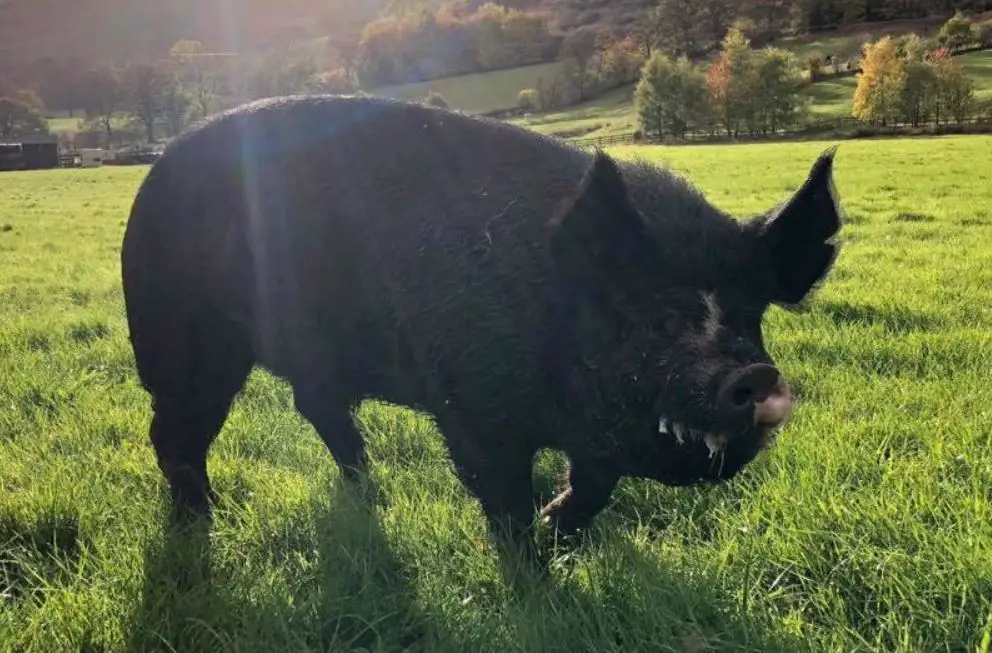
The Berkshire pig is a breed of rare pig, and it’s well known for its quality meat production. But if you want one for a pet, they form bonds with their owner.
These pigs tend to understand feelings, emotions, instruction and enjoy physical interaction with their owner.
Where Do Berkshire Pigs Come from And Where Are They Found?
The Berkshire Pig originated from the English county of Berkshire, which is now known as Oxfordshire. These are rare breeds of pig that are raised and bred in different parts of the world.
The earliest record of the Berkshire Pig was when Cromwell’s troops were quartered in Reading. There was a reference made to the size and quality of bacon and ham from a locally bred pig.
These pigs were coarser and larger than the Berkshire Pig of today. The color of these pigs was sandy red to black with sometimes spots and white patches.
The breed was influenced by introducing Siamese and Chinese pigs. This resulted in the Berkshire Pig that is known today.
The first Berkshire was exported to the US in 1823. The trend for these pigs continues throughout the century. At the end of the 19th century, there were herds established in New Zealand and Australia.
What Do They Look Like?
Your Berkshire pig will be black with white parts around the nose, tail, and feet area. The head is small and makes its back appear more expansive than it is.
Your pig’s face can look like a flat circular shape when looked at from a certain angle.
The ears are usually pointed upwards or pricked up. Many people who own these pigs say this is what makes a Berkshire adorable. The snout of the pig is short and upturned. The average height of your pig will be about 27-29 inches regardless of sex.
If your pig is a male, he could top out at about 600 pounds or even higher. If it’s a female, the weight would be around 396 pounds but still could become larger than that.
Berkshire pigs have non-sharp teeth and regular teeth. The needle teeth are clipped right after the pig is born. The sharp teeth are replaced with normal teeth that grow in their place.
Both sexes have tusks, with the male tusks extending out of their mouths. The female has shorter tusks that rarely have the length to extend from the mouth.
The tusks serve as a defensive weapon, but domestic pigs usually have the tusks removed. Unfortunately, if the tusks are removed, they won’t grow back.
Berkshire pigs have dewclaws and hooves that may need to be trimmed. Your pig will need to be trimmed once a year at least. If your pig is an indoor pig, he will require more trimming than if he lives in a stable.
Your pig will have a curly tail, and there are a lot of theories why they do. A pig’s tail is basically used to drive away insects in areas that their mouth can’t reach.
What Are Their Characteristics?
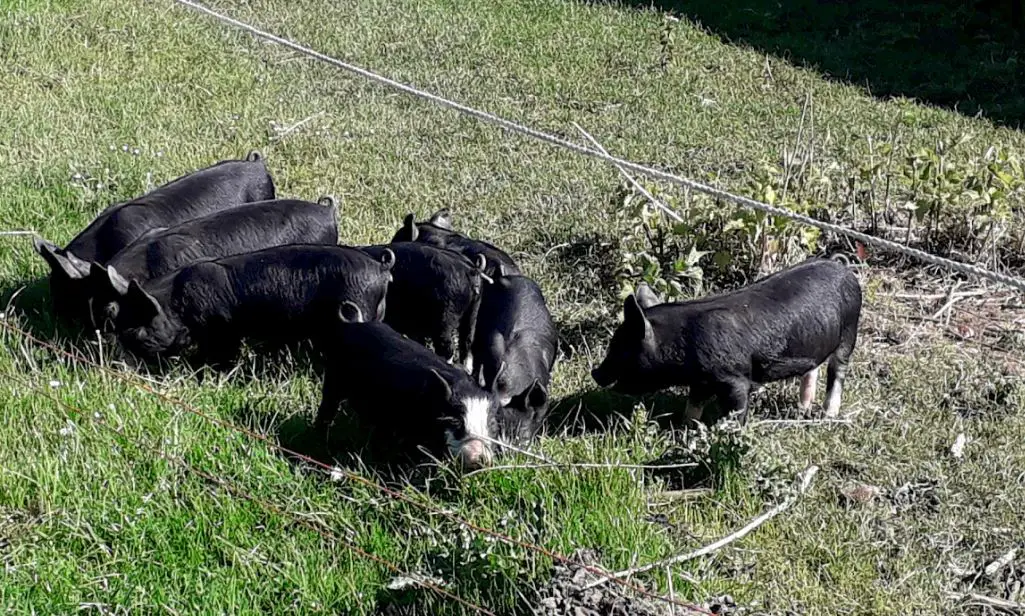
Personality
Berkshire pigs are friendly towards people and have a naturally curious nature. Your pig may enjoy some physical interactions as well. These pigs are docile despite their size.
Temperament
Your pig has an easy-going temperament and is friendly towards other animals.
Tendency To Bite
A Berkshire pig will bite one another if they are fighting. Plus, they will bite if the pig is protecting its young or itself. The piglets also bite their mother when trying to suckle. This is why clipping your pig’s teeth when firstborn is encouraged.
Intelligence
Pigs are ranked as the fifth most intelligent animal in the world. Berkshire pigs are just as smart as well. They are capable of outsmarting chimpanzees, and some owners say their pig is more intelligent than a dog.
These pigs have a great memory, learn fast, and learn fast because they can focus better. Pigs may be so bright because of learning to outsmart their predators.
Emotional
Because these pigs are so intelligent, they are capable of feeling both positive and negative emotions. Your pig can feel pain, become excited, and become depressed. Likewise, a Berkshire pig can sense grief or sadness from other animals, their owners, or companions.
Exercise Needs
Your pet pig will enjoy walking outside in the sunshine. Pigs need a sufficient amount of exercise to stay healthy. It allows your pig to graze on grass and walk around. If you don’t have an area where you can let your pig run around, you can take him for a walk on a leash.
Life Expectancy
You can expect your pet pig to live between 15 to 20 years. A wild pig lives only 4 to 7 years. So, if your pig is well cared for and healthy, he will live a long time.
Health Issues
There are six most common diseases that your pig could possibly develop.
Preweaning period
- Exudative dermatitis (greasy pig): Skin lesions are caused by bacteria from infection Staphylococcus hyicus.
- Coccidiosis: This disease is caused by three types of intracellular parasite coccidia in suckling piglets.
Post-weaning period
- Respiratory diseases: If your pig is sneezing, coughing, abdominal breathing, reduced growth rates, and potential morality are all the signs of respiratory illness.
- Swine dysentery: Your pet would be suffering from diarrhea with or without blood appearing in the stool.
Breeding stock
- Mastitis: This occurs in female pigs who have had piglets. Reduced milk production, a higher body temperature, and a loss of appetite are symptoms of mastitis in female pigs.
- Porcine parvovirus: A reproductive disease can sometimes occur if your female pig is pregnant and becomes infected with parvovirus.
Price
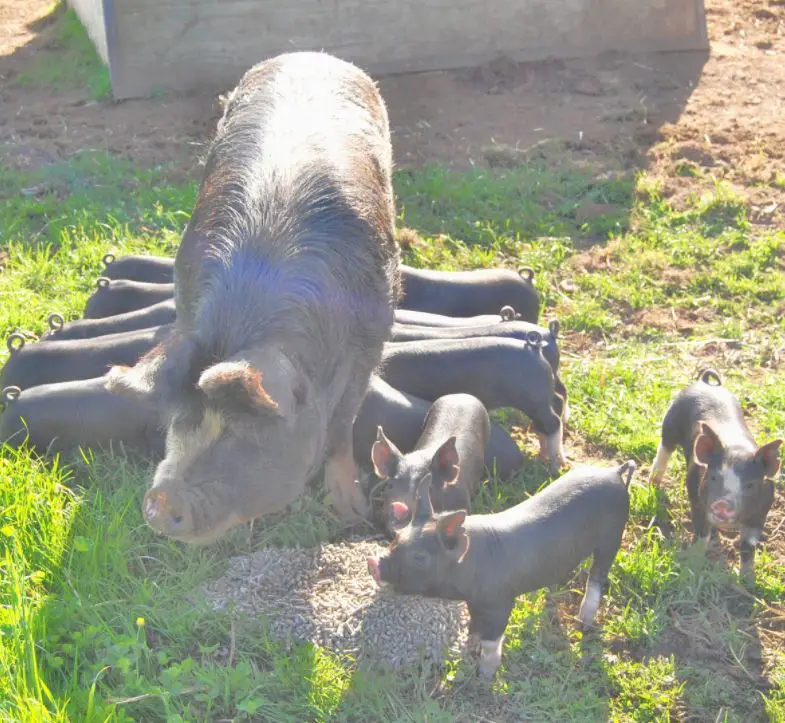
The average price of a Berkshire piglet is around $100 to $150. Unfortunately, Berkshire pigs are rare and difficult to find. If you want to buy one, you will have to visit online websites or local farming societies. The price could differ from region to region.
How large of a pig you want to buy is also a consideration. If you want a mature or adult pig, then the price could be double. But the price could be cheaper if the pigs were bought in bulk. Bulk purchases always cost less than purchasing an individual pig.
But it is advisable to purchase your pet from a reputable breeder. The price may be higher, but you’ll receive a healthy, well-bred pig. If you buy from an unknown, you can get a cheaper price, but you may end up with a sick pig.
Pros
- Purebred Heritage Pig: This is one of the heritage breeds which are gentle towards people and other animals.
- Good Family Pet, Gets Along with Everyone – Friendly Towards People: A Berkshire pig is friendly, gets along well with other animals, and can develop a relationship with its owner.
- Not Picky Eaters: When it comes to feeding, your pig will eat it if it’s edible. A pig has a stomach of steel which means he can eat about anything without getting sick. But just because he can eat anything doesn’t mean you should just feed them whatever. Some foods will weaken his immune system and be harmful to his health.
You should feed your pet fruits and vegetables and pig pellets. Berkshire pigs love to eat grass and dig up certain insects and roots. Plus, pigs drink 5 to 10 liters of water a day.
- Clean Animals: Berkshire pigs, in fact, any pig, is one of the cleanest animals. Pigs are not dirty animals who love to play in the mud. Since pigs don’t sweat, they are looking for a way to cool off. So, mud pools are how a pig cools off.
Cons
- Needs Enough Space: Your pig won’t be happy staying in one spot. The spacing requirements depend on the age and size of your pet. Berkshire pigs love to be free-range and roam around the area.
- Emotionally Sensitive: Since your pet pig has the emotional level of a child, your pet can become bored quickly when left alone or isolated. He can become irritable if kept in too small of a space.
Your pig can throw a tantrum, become stubborn, spoiled, dominant, or manipulative but rarely become violent.
- Large Size: These pigs can become enormous, and it could be a problem if you don’t have the proper space for them.
Berkshire Pigs Vs. Other Pigs
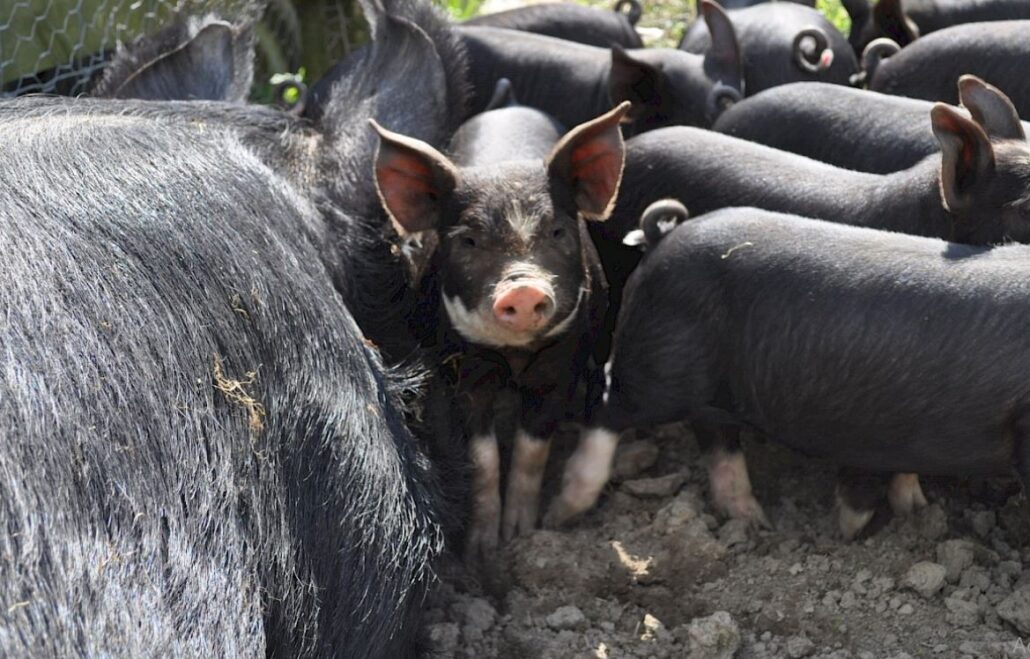
Here is a list of some of the other heritage pigs compared to the Berkshire pig:
- American Yorkshire Pig: The American Yorkshire pig was initially bred and raised in England. But they were further developed in the United States. These pigs are known for good meat, bacon, and hams. Plus, they are known for their mothering ability.
- Gloucestershire Old Spots Pig: These pigs are also known as GOS and are from England. They were used in England to clean up orchards. You may have to wait on a list to get one in the United States as there are very few in the States. GOS’s require a lot of shade in a warmer, sunnier climate because of their light skin.
- Hampshire Pigs: This is one of the oldest American breeds still in existence. These pigs have a white belt around the front of their body, including the front legs. The Hampshire pig are excellent pigs for forging, produce quality meat and are very hardy.
- Hereford Pigs: This is a lean meat hog and is considered pretty. They are often the pig chosen for 4-H and FFA fairs. They can be adapted to being raised in a semi-confined space or in a pasture. Herefords love to root and till and are readily available.
- Large Black Pigs: The Large Black Pig is easy to manage, hardy and thrifty. This pig originated in England and is also known as the Lop-eared Black, Devon, or Cornwell. The pig’s body is deep and long because they were initially bred to be a bacon-type pigs. The Large Blacks do well in pastures, and their dark pigmented skin means that they won’t become sunburnt.
- Tamworth Pigs: These pigs are smaller than other breeds and are originally from England. They are raised to produce tasty bacon.
Are Berkshire Pigs Good Mothers?
Berkshire pigs become sexually mature at around six to seven months. A female can become pregnant at five months but is typically bred at six months or a year old.
However, breeders may prefer to breed the females at a year old, so the pregnancy is secure and the female healthy.
The Berkshire pig is a giant pig and has a threatened population, so the birthing process is carefully handled. As a result, a female Berkshire pig has excellent mothering skills and reproductive efficiency.
A female Berkshire pig usually has between 10-20 piglets at birth.
Tips For Raising a Berkshire Pig
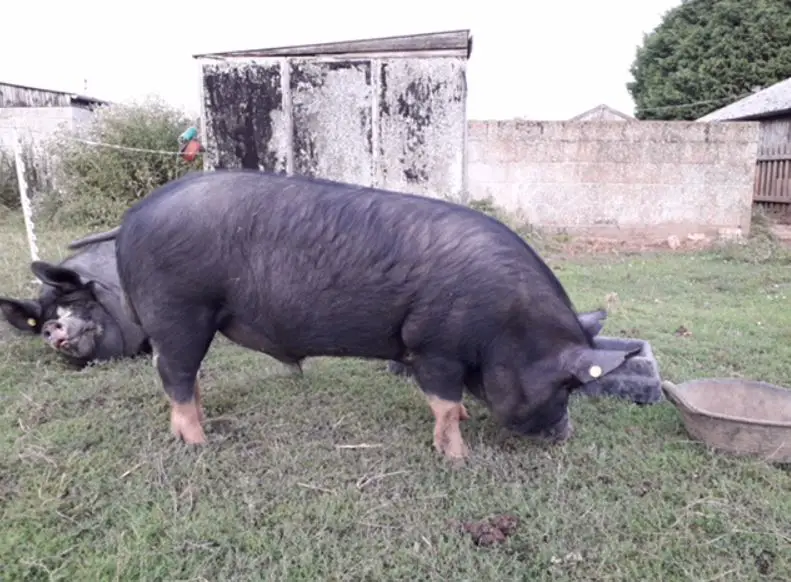
Berkshire pigs are trainable, and many pig owners say they learn faster than dogs. Pigs can be house trained. They can learn to play fetch tricks and even use a litter box. The treat method is the best way to train and works well.
Berkshire pigs are prey animals and need to be kept safe from predators. If you let yours graze outside, you need a fence to keep stray dogs, coyotes, and even wolves away from them.
Berkshire pigs, like most other pigs, have difficulty cooling off because they can’t sweat. Therefore, you need to keep them in an area that can keep them cool.
Harsh weather conditions, such as extreme heat or cold, storms, or rain, are conditions they much be sheltered from.
Conclusion
Is a Berkshire the pet for you? They are good as pets and sociable animals who enjoy being around other animals and people.
They will bond to their owners and even follow you around. If this is the kind of pet you would enjoy in your backyard or field, the choice is yours.
To learn more about Berkshire pigs, click the link below:
https://www.youtube.com/watch?v=qHY5g1Qhvdc
references:
https://petpigworld.comm/berkshire-pigs-the-essential-guide/
https://agro4africa,com/berkshire-pig/
https://www.thepigsite.com/breed/berkshire
https://www.wattagnet.com/articles/26329-pig-diseases-you-should-know


